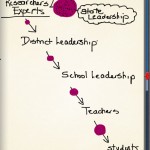The climate is toxic and the vultures are circling. Union partnerships are being used against educators in the court of public opinion in a way that shifts the conversation from exemplary teaching to benefits and bargaining. They are important topics – congruent and related, but not the same. Gains made on one front can create momentum for the other. But, the reverse occurs far too frequently.
We must diversify. Teachers unions can, and should, continue to be an important voice; further, organizations such as the NEA have done important work in the advancement of teaching practice. Sometimes they have been the only organized voices for improvement. However, something is wrong when in seemingly every media-promoted debate – whether about teacher salaries or changes in assessment practice – people closely affiliated with either the NEA or the filmmakers behind "Waiting for Superman," are pitted against each other. This blatantly undermines our mission. If you watch these conversations carefully, you see an inevitable distrust of the educator asserted, as if he or she is somehow trying to pull something over on children in order to get a better benefits package. As oversimplified and misguided as that characterization is, it is a bi-product of our headline-driven and controversy-starved culture.
And, it works.
We need to strengthen our voices as professionals; too often decision-makers assert that if they can counter the unions, teachers are not a force that should cause concern. They assume we will go away, quietly. Honestly? These people aren't stupid; they're right.
We have to prove otherwise. To a person, we rarely advocate for practice, but that is what professionals do. No membership card required.
Teachers may need their unions to get a fair compensation package, but they don't need them to be advocates for children, strong instruction, and the respect they deserve as highly trained technicians, managers, and artists.
Principals, paraprofessionals, school psychologists, researchers, school nurses, and curriculum directors: Use your voice. Strengthening teaching is not, by default, a union message; it has become identified as such because none of the rest of us will organize and lead. We must fight on two fronts with many voices: one to support the livelihood of teachers and another to support the future of our students. And, although they are related, they are not identical.
I believe in military terminology it would be considered splitting and flanking. And with a little energy, some applied intellect, and a lot of luck, maybe children AND those who educate them can win.








